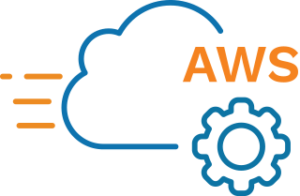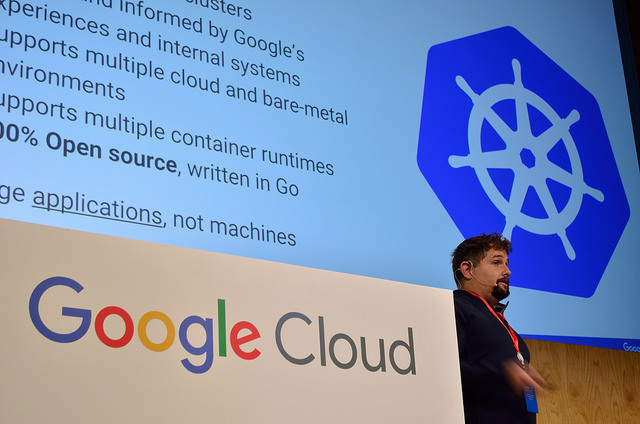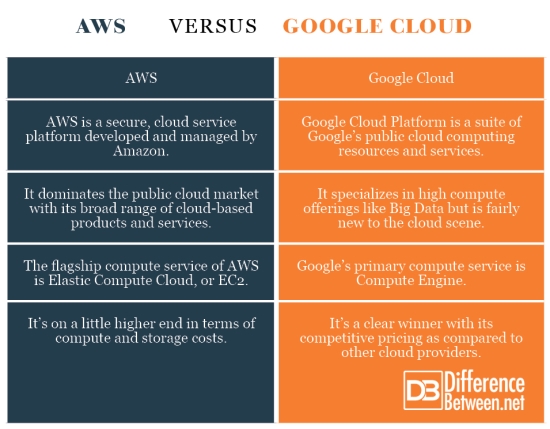Difference Between AWS and Google Cloud
Cloud is undoubtedly the next big thing in the tech world after the rise of the internet. The increasing use of data and information every day has forced businesses and organizations to turn to a more efficient and safe data storage solution – cloud. Data usage grew multifold in the past couple of years owing to the rapidly falling mobile internet rates and enterprises data centers find it difficult to manage mass quantities of data on a daily basis. This is where cloud comes to the picture. Cloud is an off-site storage space managed by cloud service providers to offer agility and safety over online data centers. Amazon Web Services (AWS) is one of the major players in the cloud space that’s been transforming the storage game for quite some time now. Google Cloud Platform is also a big name in cloud computing and the biggest competitor to the AWS legacy. Let’s take a good look at the two cloud computing giants and understand the difference between the two.
What is AWS?
AWS, short for Amazon Web Services, is one of the world’s top three cloud service providers that offers on-demand cloud computing platforms to individuals, businesses and organizations. It is a secure, cloud service platform developed and managed by Amazon that allows businesses to scale their storage space up or down based on the demands. It has been at the forefront of the cloud revolution being one of the first cloud service providers to enter the cloud space.
AWS provides a wealth of offerings including compute power, database storage, infrastructure management, application development, content delivery, security, and other functionality to help businesses scale and grow. It was also one of the first companies to enter the serverless computing space which allows you o build and run serverless applications using a plethora of fully managed services provided by AWS. The company released a serverless compute service under the name “AWS Lambda” in 2014 as part of the Amazon Web Services.
What is Google Cloud?
Google Cloud Platform is a suite of public cloud computing services offered and managed by search giant Google.
It provides a range of services including Google Cloud Hosting and Compute Engine and its world-scale infrastructure and security model is what keep businesses and organizations secure and compliant. It provides a serverless environment to build and connect cloud services with a large focus mainly on the microservices architecture.
Its serverless efforts paid off in 2008 when the company launched the Google App Engine – a web framework and a platform-as-a-Service (PaaS) product that allows developers and enterprises to develop and host custom web applications in Google’s data centers.
Other core products in the Google Cloud Platform include Google Container Engine, Google Cloud Storage, and Google Compute Engine. Google also offers Google Cloud IoT, a fully managed services and offerings for connecting and consuming data from IoT devices.
Difference between AWS and Google Cloud
-
Basics of AWS and Google Cloud
AWS (Amazon Web Services) is one of the world’s top three names in the cloud computing space that offers on-demand cloud computing platforms to individuals, businesses and organizations.
AWS is offered and managed by Amazon as Infrastructure-as-a-Service (IaaS) that provides everything from storage and server to virtualized computing resources over the internet and users are responsible for managing the middleware, OS, runtime, data, and applications.
Google Cloud Platform, on the other hand, is a suite of Google’s public cloud computing services that is made available to the users in the form of virtualized resources.
-
Services and Offerings
AWS is the clear winner in terms of services and offerings, being the leader in the Infrastructure-as-a-Service (IaaS) space.
With a nearly five years head-start, AWS offers a wealth of cloud-based products and services including database storage, compute power, infrastructure management, networking and content delivery, analytics, Artificial Intelligence, Internet of Things, application services, and more.
Google Cloud also performs fairly well in terms of cloud-based services considering it is new to the cloud scene, but it still lags behind the major players like AWS. However, the one particular area where Google Cloud clearly excels is Big Data.
-
Pricing of AWS and Google Cloud
One of the key differences between AWS and Google Cloud is the pricing model. AWS offers a pay as you go pricing model for its 100+ cloud services meaning you only have to pay for the services you use and no additional costs incur when you stop using the same services.
Google Cloud charges an average 60 percent less for computing workloads as compared to other cloud computing providers including AWS, with no upfront costs involved. Google is the winner with its competitive pricing. For example, a 2 CPU 8GB RAM instance is going to cost a whopping $69 a month for AWS, where the same configuration costs a mere $50 a month for Google Cloud Platform.
AWS vs. Google Cloud: Comparison Chart
Summary of AWS Vs Google Cloud
Bottom line is, individuals or businesses, mostly startups that are looking to grow their business quickly would be likely to choose Google Cloud as their preferred cloud vendor. But, if you’re looking for a cloud vendor with the most experience in the cloud space and the one with an extensive catalog of services and offerings with a global recognition, AWS is the right choice for you. Well, both are the two big names in the cloud sphere with years of experience, the thing that differentiates the two is their approach to cloud computing. At the end of the day, it’s all get down to your need and requirements.
- Difference Between HTML and Text - April 19, 2024
- Difference Between FTP and SFTP - April 16, 2024
- Difference Between El Nino and La Nina - April 13, 2024
Search DifferenceBetween.net :
Leave a Response
References :
[0]Image credit: https://www.flickr.com/photos/opengridscheduler/37129388574
[1]Image credit: https://upload.wikimedia.org/wikipedia/commons/thumb/5/5c/AWS_Simple_Icons_AWS_Cloud.svg/600px-AWS_Simple_Icons_AWS_Cloud.svg.png
[2]Jamsa. Cloud Computing. Burlington: Jones & Bartlett Learning, 2012. Print
[3]Golden, Bernard. Amazon Web Services For Dummies. New Jersey: John Wiley & Sons, 2013. Print
[4]Geewax, John. Google Cloud Platform in Action. Shelter Island, New York: Manning Publications, 2018. Print



